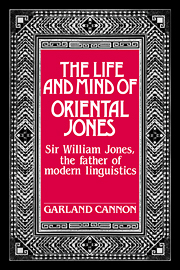Book contents
- Frontmatter
- Contents
- Preface
- Introduction
- Chronology of Jones's Life
- 1 A Barbaric Oriental Conqueror (to 1770)
- 2 Delicate Arab Maidens and Liquid Ruby (1770–1772)
- 3 Persian Jones and Constitutional Law (1772–1777)
- 4 The Athenian and Eleutherion (1778–1780)
- 5 An Ass Laden with Gold (1780)
- 6 Politics: Writings and Activism (1780–1782)
- 7 James River Property (1782–1783)
- 8 A Vision in the Indian Ocean (1783–1785)
- 9 A Sacred Oriental Language (1785)
- 10 A Genetic Explanation: Indo-European (1786–1787)
- 11 Sanskrit Literary Treasures (1787–1788)
- 12 An Indian Renaissance (1789)
- 13 A Burning Tropical Sun (1790–1791)
- 14 Scholar-Martyr (1791–1794)
- 15 Jones Today
- Appendix Five New Letters by Jones
- Notes
- Selected Bibliography
- Index
10 - A Genetic Explanation: Indo-European (1786–1787)
Published online by Cambridge University Press: 11 September 2009
- Frontmatter
- Contents
- Preface
- Introduction
- Chronology of Jones's Life
- 1 A Barbaric Oriental Conqueror (to 1770)
- 2 Delicate Arab Maidens and Liquid Ruby (1770–1772)
- 3 Persian Jones and Constitutional Law (1772–1777)
- 4 The Athenian and Eleutherion (1778–1780)
- 5 An Ass Laden with Gold (1780)
- 6 Politics: Writings and Activism (1780–1782)
- 7 James River Property (1782–1783)
- 8 A Vision in the Indian Ocean (1783–1785)
- 9 A Sacred Oriental Language (1785)
- 10 A Genetic Explanation: Indo-European (1786–1787)
- 11 Sanskrit Literary Treasures (1787–1788)
- 12 An Indian Renaissance (1789)
- 13 A Burning Tropical Sun (1790–1791)
- 14 Scholar-Martyr (1791–1794)
- 15 Jones Today
- Appendix Five New Letters by Jones
- Notes
- Selected Bibliography
- Index
Summary
The Society's first meeting of 1786 was held on 19 January. Jones, Hyde, and four others heard a translation of a brief Persian history. Jones seconded the nomination of John Gilchrist, an assistant surgeon who was questioning the East India Company's policy of having its servants gain some command of Persian, the language of the courts and government but not of the people. Stimulating the study of Hindustani, Gilchrist was preparing a dictionary to facilitate communication with Indians. Jones, however, never assisted, loving languages but preferring the classical to the vernacular. Sanskrit so fascinated him that there was little time for Hindi. Had he lent his talents and influence to Gilchrist's mission, conceivably Macaulay's Minute of 1835 might have been forestalled, and perhaps even a decision might have been made to use an Indian language rather than English in Indian schools.
The meeting of 2 February attracted Macpherson, Stables, Chambers, Hyde, and thirty-one others. Because members knew that Jones was devoting his Third Discourse to India, this attendance was the largest during his tenure. According to the schedule in his andrometer, he would not distill all his knowledge into multivolume works until his early fifties. He was still collecting data, directly in the Society and through European exchanges that he was fostering. Jones's system is implicit in his Anniversary Discourses, which show a preliminary integration of Oriental knowledge, although scholars stress the famous philological passage in the Third Discourse.
- Type
- Chapter
- Information
- The Life and Mind of Oriental JonesSir William Jones, the Father of Modern Linguistics, pp. 241 - 270Publisher: Cambridge University PressPrint publication year: 1991



